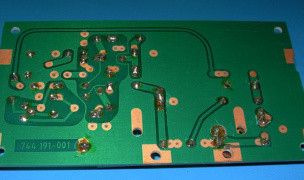 1 Terms
1 TermsHome > Industry/Domain > Materials science > Corrosion engineering
Corrosion engineering
The process of applying engineering science in the design and manufacturing of materials, structures and devices to manage and control corrosion.
Industry: Materials science
Add a new termContributors in Corrosion engineering
Corrosion engineering
Caustic
Materials science; Corrosion engineering
(1) Burning or corrosive. (2) A hydroxide of a light metal, such as sodium hydroxide or potassium hydroxide.
Scaling
Materials science; Corrosion engineering
(1) The formation at high temperatures of thick corrosion product layers on a metal surface. (2) The deposition of water-insoluble constituents on a metal surface.
Dummy cathode
Materials science; Corrosion engineering
(1) A cathode, usually corrugated to give variable current densities, that is plated at low current densities to preferentially remove impurities from a plating solution. (2) A substitute cathode ...
Hematite
Materials science; Corrosion engineering
(1) An iron mineral crystallising in therhombohedral system; the most important are of iron. (2) An iron oxide, Fe,O,, corresponding to an iron content of approximately 70%.
Ferrite
Materials science; Corrosion engineering
(1) A solid solution of one or more elements in body-centered cubic iron. Unless otherwise designated (for instance, as chromium ferrite), the solute is generally assumed to be carbon. On some ...
Active
Materials science; Corrosion engineering
A state in which a metal tends to corrode; referring to the negative direction of electrode potential (opposite of passive or noble).
Brackish water
Materials science; Corrosion engineering
(1) Water having salinity values ranging from approximately 0. 5 to l7 parts per thousand. (2) Water having less salt than seawater, but undrinkable.


